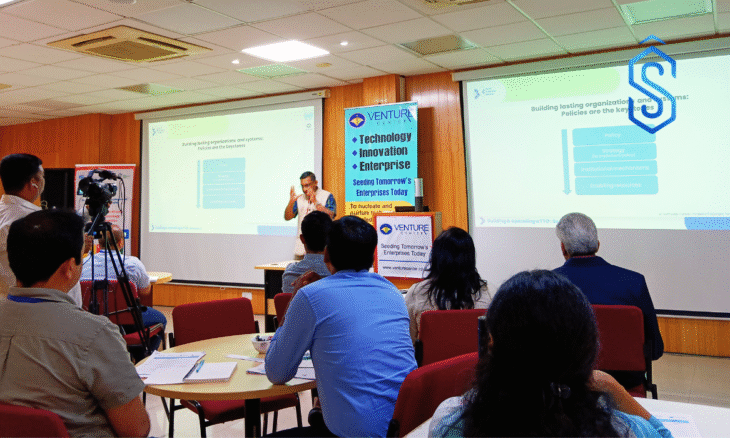Pune: Dr Premnath Venugopalan, Founder Director of Venture Center, emphasized the critical importance of aligning technology transfer office (TTO) structures and policies with the core missions of research institutions, during an expert session on innovation commercialization strategies.
Venture Center, India’s leading inventive enterprises incubator located at CSIR-NCL, in partnership with the United Nations Industrial Development Organization (UNIDO) conducted a foundational, in-person training program to strengthen the capabilities of Technology Transfer Offices (TTOs) in research institutions and higher education across India.
IP Expert, Innovation Coach and Advisor Dr Aravind Chinchure; Focus IP Group President Dr Ashley Stevens; BioProperty Strategy Group President Dr Richard Cahoon; Burnside Development & Associates President and Senior Lecturer at WIPO John Fraser also led the course during the program conducted at Venture Center in Pune.
Also Read: Venture Center Seed Funding: DeepTech Startups Invited for TDB and NIDHI-SSS Program
In his detailed address, Dr Premnath Venugopalan outlined the diverse forms that TTOs take across India and globally – from internal departments like CSIR’s business development divisions or IITs’ IRCCs, to fully independent legal entities like IFITT at IIT Delhi or Cambridge Enterprise in the UK.
“There is no one-size-fits-all model. The structure must reflect the organization’s primary objectives, available resources, and broader ecosystem,” he stated.
Highlighting global trends, Dr Premnath noted that while some TTOs bundle business development, research contracts, and consulting, others – especially in the US – maintain distinct units for tech transfer alone. “Increasingly, we are seeing tech transfer offices driving their own proof-of-concept funding or managing pre-commercial TRL advancement in-house,” he said, referring to the rising role of TTOs in parallelizing and validating technologies.
He categorized the core functions of a TTO into four primary roles: intellectual property (IP) management, technology development support, marketing and deal-making, and startup facilitation. He emphasized that while some institutions may rely on incubators or IP cells for specific functions, the overarching goal should be to enable efficient, impactful tech transfer mechanisms.
Dr Premnath also urged institutions to craft their IP and technology transfer policies with precision and institutional relevance. “Policy drafting should not be an exercise in imitation. Copy-pasting policies from other institutions, without considering internal goals and culture, can lead to friction and poor implementation,” he cautioned.
Comparing different institutional types – academia, government R&D labs, and production-focused institutions like DRDO or ISRO – Dr Premnath emphasized that their strategic objectives differ substantially. “Academic institutions prioritize knowledge dissemination and research training. In contrast, entities like DRDO focus on production-ready technologies, often with little emphasis on teaching or entrepreneurial engagement,” he said.
Also Read: Venture Center Leap Global Accelerator Launches First Cohort Featuring 15 Deeptech Startups
Technology Transfer Office: Policy Success Hinges on Clearly Stated Guiding Principles
He also stressed that technology transfer office policy success hinges on clearly stated guiding principles. Citing examples from MIT and CSIR, he showcased how institutional missions influence policy – whether favoring open dissemination of research (as at MIT) or IP maximization (as at CSIR).
“Clarity, consistency, and legitimacy are essential,” he remarked. “Written policies protect institutional memory and ensure stability despite changes in leadership or administrative structures.”
In conclusion, Dr Premnath underscored the need for technology transfer offices to act as both enablers and educators – bridging innovation and market needs, while operating within a framework that respects the distinct values and ambitions of their host institutions.










